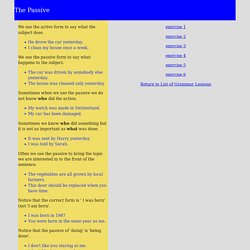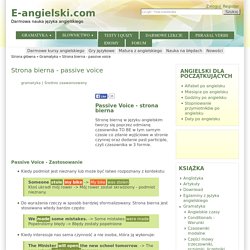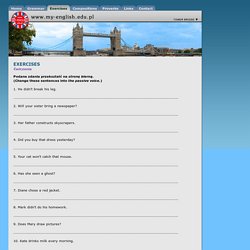

English Grammar lessons. We use the active form to say what the subject does.

He drove the car yesterday. I clean my house once a week. We use the passive form to say what happens to the subject. The car was driven by somebody else yesterday. The house was cleaned only yesterday Sometimes when we use the passive we do not know who did the action. My watch was made in Switzerland. Sometimes we know who did something but it is not as important as what was done.
It was sent by Harry yesterday. Often we use the passive to bring the topic we are interested in to the front of the sentence. The vegetables are all grown by local farmers. Notice that the correct form is ' I was born' (not 'I am born'. I was born in 1987 You were born in the same year as me. Notice that the passive of 'doing' is 'being done'.
I don't like you staring at me. When things happen or change, and especially in informal English, you can use 'get' instead of 'be' in the passive. Return to List of Grammar Lessons. Strona bierna - passive voice. Stronę bierną w języku angielskim tworzy się poprzez odmianę czasownika TO BE w tym samym czasie co zdanie wyjściowe w stronie czynnej oraz dodanie past participle, czyli czasownika w 3 formie.

Passive Voice - Zastosowanie Kiedy podmiot jest nieznany lub może być łatwo rozpoznany z kontekstu: Someone stole my bike -> My bike was stolen. Ktoś ukradł mój rower -> Mój rower został skradziony - podmiot nieznany. Do wyrażania rzeczy w sposób bardziej sformalizowany. We made some mistakes. -> Some mistakes were made Popełniliśmy błędy -> Błędy zostały popełnione Kiedy interesuje nas sama czynność a nie osoba, która ją wykonuje: The Minister will open the new school tomorrow. -> The new school will be opened tomorrow. Kiedy z jakichś powodów (z uprzejmości, chęci bycia taktownym, etc.) nie chcemy wspominać o podmiocie: I will reduce salaries of all workers -> Salaries of all workers will be reduced.
Passive/ Jak używać strony biernej? - Strona bierna (The passive) - Gramatyka angielska - Gramatyka angielska - gramatyka-angielska.info. Strona bierna nie jest specjalnie trudnym elementem w gramatyce angielskiej, głównie dlatego, że tworzona jest niemalże według jednej zasady.

Najczęściej stosujemy ją w następujących przypadkach: Gdy sama czynność jest ważniejsza niż jej wykonawca lub wykonawca czynności jest nieznany. Np.: Somebody robbed my house – Ktoś okradł mój dom. My house was robbed – Mój dom został okradziony. W przypadku tego zdania, znacznie ważniejszy jest fakt okradzenia domu, niż to, kto to zrobił. W oficjalnych ogłoszeniach i komunikatach Np.: Passangers are asked to go to gate three. – Pasażerowie proszeni są udanie się do bramki trzeciej.
W zdaniach zaczynających się od angielskiego odpowiednika „mówi się”. Np.: It is said that the rent will be raised. – Mówi się, że podniosą czynsz. Passive/ Jak tworzyć stronę bierną? - Strona bierna (The passive) - Gramatyka angielska - Gramatyka angielska - gramatyka-angielska.info. Angielska stronę bierną (passive voice) tworzymy niemalże tak samo jak polską, czyli za pomocą czasownika „to be” oraz formy Past Participle czyli trzeciej formy z tabelki.

I tak, strona bierna w określonych czasach będzie wyglądać: - Przy czasie Present Simple Strona czynna (active) – They lock the shop every day at 10 p.m. Www.my-english.edu.pl. Podane zdania przekształć na stronę bierną.

(Change these sentences into the passive voice.) 1. He didn't break his leg. 2. Will your sister bring a newspaper? Learn English - Passive Voice. Exercises on Passive Use of Passive Passive voice is used when the focus is on the action.

It is not important or not known, however, who or what is performing the action. Example: My bike was stolen. In the example above, the focus is on the fact that my bike was stolen. Sometimes a statement in passive is more polite than active voice, as the following example shows: Example: A mistake was made. In this case, I focus on the fact that a mistake was made, but I do not blame anyone (e.g. Form of Passive Subject + finite form of to be + Past Participle (3rd column of irregular verbs) Lesson A the passive: be + past participle. Lesson A the passive: be + past participle. Strona bierna w języku angielskim - zasady tworzenia i użycia. Znajomość strony biernej jest rzeczą bardzo przydatną.

Na przykład w polityce. Rzecznicy rządowi i sami politycy (w każdym kraju) uwielbiają posługiwać się stroną bierną. Przecież to od razu poważniej (i bezpieczniej dla mówiącego...) wygląda jeśli się zagrzmi: niż poinformuje wprost: Tworzenie strony biernej jest stosunkowo proste. No, rzeczywiście, ktoś musiał tym samochodem odjechać, sam tego nie zrobił, ale w tym momencie bardziej interesuje nas fakt braku samochodu niż złodziej. Nawet nie dodając, że 'przez kogoś' bo wiadomo, że jakiś 'ktoś' to zrobił.
Po ustaleniu podmiotu w takim nowym zdaniu trzeba dobrać mu jeszcze odpowiednie orzeczenie. Np. w zdaniach w czasie Present Continuous poniżej, podmiotem w stronie biernej (zdanie b) staje się a new school, czyli dopełnienie ze zdania a). Testy ćwiczenia Passive Voice (strona bierna » Język angielski online - Darmowe kursy angielskiego. Strona bierna - passive voice. PASSIVE online exercise 1. PASSIVE online exercise n°2. PASSIVE online exercise n°3. Passive Exercises. Passive Exercises Here's a list of exercises for practice with the passive: Would you like more Perfect English Grammar?

1: You could sign up for my FREE email newsletter! Passive Voice - Learning English - Grammar Exercises. The Passive 1.